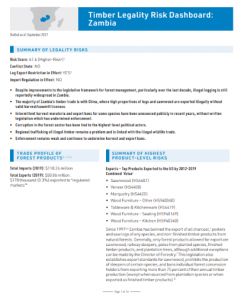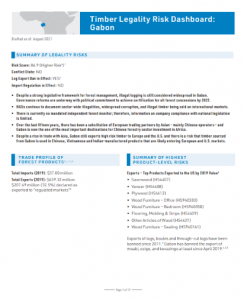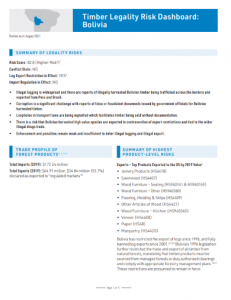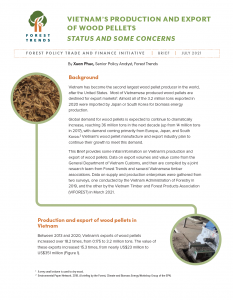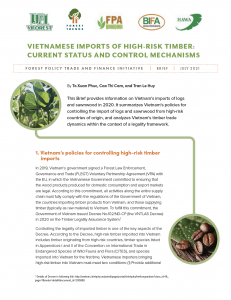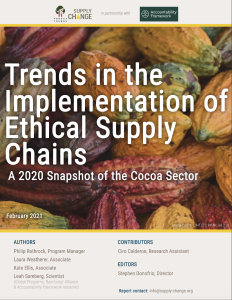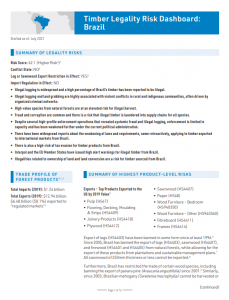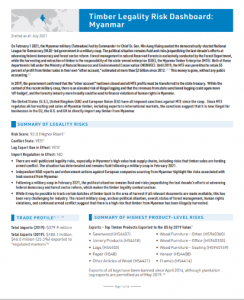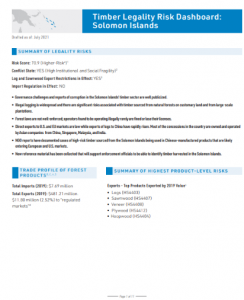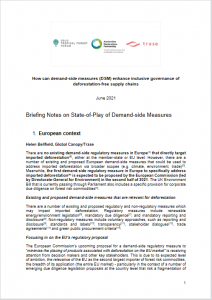Zambia Timber Legality Risk Dashboard
By Forest TrendsDespite improvements to the legislative framework for forest management, particularly over the last decade, illegal logging is still reportedly widespread in Zambia. The majority of Zambia’s timber trade is with China, where high proportions of logs and sawnwood are exported illegally without valid harvest/sawmill licenses. Intermittent harvest moratoria and export bans for some species have […]
Timber Legality Risk Dashboard: Gabon
By Forest TrendsGabon is a relatively small African nation (30th in size in Africa), with a national population of just 1.5 million, or less than 7 inhabitants per hectare on average. Gabon is home to the ecologically significant Congo Rainforest system that it shares with its neighbors: Cameroon, Equatorial Guinea, and the Republic of the Congo. The […]
Timber Legality Risk Dashboard: Bolivia
By Forest TrendsBolivia’s forest area is estimated at 50.8 million hectares (40 percent of its territory) mainly located in the east and north of the country. Bolivia has seen a 9.5 percent decrease in forest cover since 2000, with soaring rates of forest destruction widely reported in 2019 and 2020. Bolivia became the third highest country globally […]
Email Signup
Subscribe to any of Forest Trends’ mailing lists to keep up with the news, publications, and events that interest you.
Having Trouble?
If you experience any technical difficulties on our site, please contact Genevieve Bennett, Communications Manager.
Vietnam’s Production and Export of Wood Pellets: Status and Some Concerns
By To Xuan PhucThis Brief provides some initial information on Vietnam’s production and export of wood pellets. Data on export volumes and value come from the General Department of Vietnam Customs, and then are compiled by a joint research team from Forest Trends and several Vietnamese timber associations. Data on supply and production enterprises were gathered from two[…]
Vietnamese Imports of High-Risk Timber: Current Status and Control Mechanisms
By To Xuan PhucThis Brief provides information on Vietnam’s imports of logs and sawnwood in 2020. It summarizes Vietnam’s policies for controlling the import of logs and sawnwood from high-risk countries of origin, and analyzes Vietnam’s timber trade dynamics within the context of a legality framework.
Trends in the Implementation of Ethical Supply Chains: A 2020 Snapshot of the Cocoa Sector
By Philip Rothrock, Laura Weatherer, Kate Ellis, Leah Samberg, Stephen Donofrio, Ciro CalderonOver the past few decades, cocoa production has emerged as a driver of land use change, particularly in West Africa. In addition to its significant contributions to deforestation, cocoa production has also faced intense public scrutiny due to human rights violations, especially the use of child labor. In Trends in the Implementation of Ethical Supply[…]
Timber Legality Risk Dashboard: Brazil
By Forest TrendsIllegal logging has soared since 2012, particularly in natural forests. In 2020, deforestation in Brazil’s Amazon rose to its highest level in more than a decade, and recent reports indicate that forest clearances in Brazil’s Amazon region rose 17 percent in the first six months of 2021. While Brazil saw dramatic reductions in deforestation and […]
Myanmar Timber Legality Risk Dashboard
By Forest TrendsOn February 1, 2021, the Myanmar military (Tatmadaw) led by Commander-in-Chief Sr. Gen. Min Aung Hlaing ousted the democratically-elected National League for Democracy (NLD)-led government in a military coup. The political situation remains fluid and risks jeopardizing the last decade’s efforts at advancing federal democracy and forest sector reform. Forest management in natural Reserved Forests […]
Solomon Islands Timber Legality Risk Dashboard
By Forest TrendsGovernance challenges and reports of corruption in the Solomon Islands’ timber sector are well publicized. Illegal logging is widespread and there are significant risks associated with timber sourced from natural forests on customary land and from large-scale plantations. Forest laws are not well-enforced; operators found to be operating illegally rarely are fined or lose their […]
Briefing Notes on State-of-Play of Demand-side Measures: Oslo Tropical Forest Forum
How can demand-side measures enhance inclusive governance of deforestation-free supply chains?
By Michael WolosinIn partnership with Amsterdam Declarations Partnership and Trase, the Oslo Tropical Forest Forum is hosting an open interactive multi-stakeholder dialogue on the 29th of June 2021 to discuss the opportunities and challenges of deforestation-free demand-side measures to foster inclusive approaches for supply chain governance. The dialogue will include expert presentations on the state of play […]

